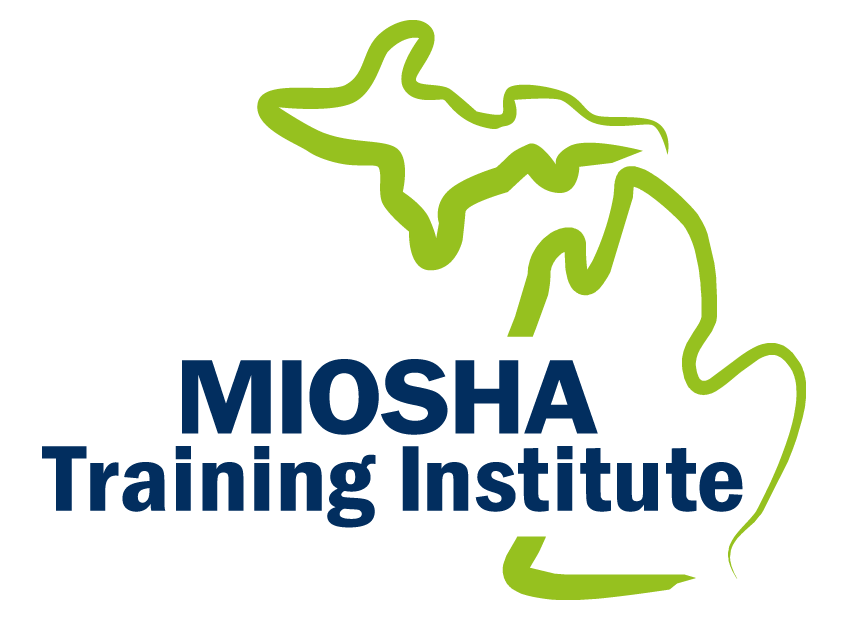|
MIOSHA Understanding and Improving Your Safety Culture -
This course will provide the knowledge and tools for participants to gain an understanding
of the factors that affect culture and how it impacts safety performance. Management
Leadership/Commitment and Employee Involvement are the most critical components of
having an effective Safety and Health Management System (SHMS). This course will use
data, examples, case studies, and activities to illustrate best practices and assist
participants in improving their company’s safety culture.
Register Now
|
|
MIOSHA Part 21 - Powered Industrial Trucks: "What Every Trainer and Operator Must
Know" -
This course covers the training and operating requirements for powered industrial
trucks in general industry workplaces. Safety topics include: training program implementation;
operator selection, training, testing, and permitting; inspection procedures; safe
work practices; retention of training and maintenance records; and identification
of types of powered industrial trucks. Occupational health topics include information
on carbon monoxide, ventilation controls, personal protective equipment, and emergency
eye flush and shower facilities. Resources and sample documents will be provided to
assist attendees with implementing a powered industrial truck program in their workplace.
This training session will also provide an overview of common exercises used for field
evaluations.
Register Now
|
|
MIOSHA Continuous Safety and Health Improvement -
This course moves beyond the initial development and implementation of a Safety and
Health Management System (SHMS) to the ongoing responsibilities for evaluation, maintenance,
and participation in the system to affect continuous improvement. This course focuses
primarily on building and sustaining management commitment and employee involvement.
It is highly recommended that students complete "Recommended Practices for Safety
and Health Programs” before taking this course.
Register Now
|
|
MIOSHA Parts 6, 33, 433 Personal Protective Equipment for GI and Construction –
This course will provide the participant an overview of MIOSHA personal protective
equipment (PPE) requirements contained in MIOSHA General Industry Parts 33 and 433,
as well as MIOSHA Construction Part 6. Methods for conducting and documenting hazard
surveys, PPE selection and maintenance criteria, and PPE training requirements are
described. Sample PPE photos and scenarios will be included and discussed in the program.
Tools for PPE hazard surveys will be provided to assist students in conducting and
documenting hazard surveys in the workplace.
REgister now
|
|
MIOSHA Fundamentals of Industrial Hygiene -
Industrial Hygiene is the science devoted to the anticipation, recognition, evaluation,
and control of health hazards in the workplace. This course will discuss the various
categories of health hazards and their routes of exposure. Participants will learn
terminology and fundamental concepts essential to understanding industrial hygiene
standards and studies.
Register Now
|
|
MIOSHA Silica Awareness -
Crystalline silica is a common mineral found in such materials such as sand, stone,
concrete, mortar, and many other products. It is a common product utilized in many
construction and general industry processes. This course will discuss the various
health hazards and their routes of exposure in relation to respirable silica exposures
within the workplace. Participants will learn applicable terminology and fundamental
concepts essential to understanding and reducing and/or eliminating employee exposure
to respirable silica dust in the general industry and construction fields. Participants
will be reviewing applicable components of the standards specific to Part 590, Silica
in General Industry and Part 690, Silica in Construction. Participants will also learn
how to implement safe work practices when employees can be exposed to respirable silica.
Register Now
|
|
MIOSHA Industrial Robotic Safety -
Today’s work environment requires employers to utilize safe maintenance practices
and effective operator protections to prevent harmful contact between robots and employees.
This course is focused on the daily interaction of the worker and robot in the industrial
setting. Attendees will review successful safety practices applicable to robotic operations
in Michigan workplaces. Short group discussion of collaborative robots’ safety in
the workplace. Historic and current employee injuries caused by robot contact will
be reviewed. The course will cover risk assessment and evaluation of safeguards and
an overview of hazard recognition.
Register Now
|
|
MIOSHA Part 380 - Occupational Noise Exposure -
This seminar is designed to give participants an understanding of the requirements
of MIOSHA’s Part 380 - Occupational Noise Exposure. Topics covered include: definition
of noise; hearing loss and how it can occur; determining when and why to conduct noise
monitoring; determining when a Standard Threshold Shift (STS) occurs and when to record
it on the 300 log, noise training requirements, noise control technologies and how
to select proper hearing protection. Participants will have “hands-on” opportunities
to use noise dosimeters/sound level meters and calibrators and assess noise levels
associated with actual noise sources.
Register Now
|
|
OSHA General Industry 10 Hour
Many companies are faced with the need for employees to perform new or multiple job
functions. As personnel shifts to accommodate business needs it is essential to understand
the importance of safety and health programs and their effect on business. This course
offers an introduction to OSHA and MIOSHA, the resources and tools to create or enhance
an effective safety and health program, and highlights of many key General Industry
Safety and Health Standards. In this two-day course, each student will receive an
OSHA General Industry 10-Hour card upon successful completion of the course.
Register Now
|
|
MIOSHA Part 451-Respiratory Protection
This full-day course was developed to teach participants: the requirements of Part
451, Respiratory Protection (1910.134), the necessary elements of a written respiratory
protection program, MIOSHA
interpretations of common questions about the Respiratory Protection Standard, and
the most common violations associated with the standard.
Register Now
|
|
MIOSHA Job Safety Analysis Made Easy 2026
Job Safety Analysis (JSA) has been identified as a key component in an effective Safety
and Health Management System. Training will provide attendees with the tools and knowledge
required to prioritize, create, use, and review a JSA program to enhance their overall
Safety and Health Management System. In addition, worksite analysis is one of the
five required elements used to judge a company’s readiness for inclusion in the prestigious
Michigan Voluntary Protection STAR program. The JSA training will help participants
justify the need for a hazard identification program to their upper management and
create buy-in from production employees.
Register Now
|
|
MIOSHA Part 10 - Cranes & Derricks
This course will review the MIOSHA regulations found in Part 10, Cranes and Derricks.
Rules regarding crane assembly and disassembly, inspections, safe operation, power
line safety, and required training, certifications and qualifications will be covered.
The course will describe current best practices and regulatory changes with emphasis
on recognizing hazards and complying with the 2016 revision to the Part 10 standard.
Register Now
|
|
MIOSHA Parts 42, 92, 430 Hazard Communication and Right to Know Requirements
This course is designed to provide the learner with an understanding of the requirements
of the 2012 MIOSHA Hazard Communication Standards for Construction Safety and Health,
General Industry Safety, and Occupational Health, (Parts 42, 92, and 430) as well
as Right-To-Know Requirements in Act 154. This includes the new requirements related
to the Globally Harmonized System of Classification and Labeling of Chemicals (GHS).
Upon completion of this course, participants will be able to evaluate an existing
hazard communication program and/or create and implement a hazard communication program
that is compliant with the 2012 changes. The goal of the course will be to protect
employees by increasing employer compliance with the requirements of this standard.
Register Now
|
|
MIOSHA Recordkeeping & Cost of Injuries
This MIOSHA program is designed to help employers ensure that their organization complies
with MIOSHA recordkeeping requirements as contained in MIOSHA Administrative Rules
Part 11, Recording and Reporting of Occupational Injuries and Illnesses. In addition
to learning and understanding the “recordability” of work related injuries and illnesses,
attendees will actively participate in a group exercise to complete the MIOSHA 300
log. Using this data, participants calculate injury and illness rates and learn how
to compare these rates to other companies with their North American Industrial Classification
System (NAICS).
Register Now
|


